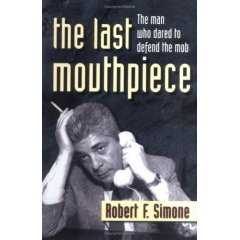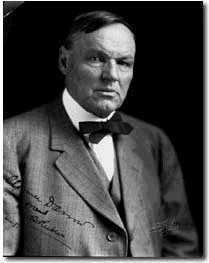Related Topics
Outlaws: Crime in Philadelphia
Even the criminals, the courts and the prisons of this town have a Philadelphia distinctiveness. The underworld has its own version of history.
Philadelphia Legal Scene
The American legal profession grew up in this town, creating institutions and traditions that set the style for everyone else. Boston, New York and Washington have lots of influential lawyers, but Philadelphia shapes the legal profession.
Mouthpiece of the Mob

|
| Advocate for the Mob |
Robert F. Simone, a defense lawyer for Philadelphia Mafia bosses, was sentenced to four years in prison, and published a book in 2001 about his bizarre experiences called The Last Mouthpiece: the man who dared to defend the mob. Even taken with several grains of salt, the book contains a lot to make us ponder.
The criminal justice system is one of those necessary parts of society that most of us don't wish to know much about. But there's an awful lot of it, it's dreadfully expensive, and it is permitted to become even less satisfactory when it's obscure. It would seem, for example, that almost everybody who is brought to trial is ultimately found guilty. A criminal defense lawyer who happened to sit next to me at a luncheon said that in thirty years of practice, she could only remember two cases where her client was clearly not guilty. But if you attend a dozen or so trials at 13th and Arch Street, you come away with the feeling that the justice system is pretty inefficient and haphazard, with the defendants often admitting to things a spectator sees no reason for them to admit, and often getting packed off to jail after less formality than a spectator would seemingly wish for himself. The Sixth Amendment to the Constitution guarantees representation by a lawyer, but that representation often lacks the vigor one would pray for. The system seems to be run on the principle that these defendants are probably guilty of something and what matter if it isn't this particular thing, it would be something else.
From these unproven surmises, I come away with the impression that the system has possibly been relaxed a little too far in their favor; these people do such a poor job defending themselves that the system helps them a little. For one thing, the common criminal can't afford a good defense if it is going to cost several hundred dollars an hour, for several weeks. But then all of a sudden a mafiosa, or godfather or whatever, comes to court with unlimited cash for lawyers, thinks nothing of hiring investigators to go find additional evidence, has no problem paying the expenses of new witnesses, whether expert or non. Equal treatment under the law requires that the leniency built into the system for chronic losers must also be available when the public prosecutor is suddenly outgunned. Maybe that's not truly the case, but it is definitely the impression you get.

|
| Clarence Darrow |
Bobby Simone's book seems to attribute his success to two strategies, both of them traceable back to Clarence Darrow. The first is to pounce on each and every mistake made by the judge or the prosecutor and make a great fuss about it. The second is to attack the credibility of the witnesses. Since the reported requirement for mafia membership is to have participated in at least one murder, a competent defense lawyer can easily make it impossible for a jury to believe anything such a criminal swears to on the witness stand, at least if the assertion is that the godfather ordered a mob rub-out. Without credible witnesses, no conviction is possible. At least according to this book, it is thus possible to discuss a new murder every five pages, and its "not guilty" verdict in five more, time and again in a several-hundred-page book. If the ordinary reader is dismayed, the judges, prosecutors, and FBI agents are seething with rage and frustration. The press convinces the public that these defendants are guilty of dozens of murders, the pressure is intense. So, just get rid of that lawyer and things will revert back to the normal string of confessions and convictions, most of which are warranted.
The book spins a convincing argument, even when you understand it is spun by a partisan with an ax to grind, at the end of a career of making the best out of what may often be weak arguments. If the government side of the prosecution seems to have played unfair with him, it is probably true that organized criminal activity in Philadelphia seems greatly lessened in 2006. Let's see what happens to it after legalized gambling comes to town. In 2007.
Originally published: Sunday, December 31, 2006; most-recently modified: Friday, May 24, 2019